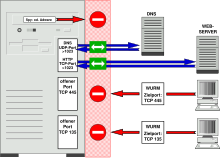
This article has multiple issues. Please help improve it or discuss these issues on the talk page. (Learn how and when to remove these messages)
|
A personal firewall is an application which controls network traffic to and from a computer, permitting or denying communications based on a security policy.[1] Typically it works as an application layer firewall.
A personal firewall differs from a conventional firewall in terms of scale. A personal firewall will usually protect only the computer on which it is installed, as compared to a conventional firewall which is normally installed on a designated interface between two or more networks, such as a router or proxy server. Hence, personal firewalls allow a security policy to be defined for individual computers, whereas a conventional firewall controls the policy between the networks that it connects.
The per-computer scope of personal firewalls is useful to protect machines that are moved across different networks. For example, a laptop computer may be used on a trusted intranet at a workplace where minimal protection is needed as a conventional firewall is already in place, and services that require open ports such as file and printer sharing are useful. The same laptop could be used at public Wi-Fi hotspots, where it may be necessary to decide the level of trust and reconfigure firewall settings to limit traffic to and from the computer. A firewall can be configured to allow different security policies for each network.
Unlike network firewalls, many personal firewalls are able to control network traffic allowed to programs on the secured computer. When an application attempts an outbound connection, the firewall may block it if blacklisted, or ask the user whether to blacklist it if it is not yet known. This protects against malware implemented as an executable program. Personal firewalls may also provide some level of intrusion detection, allowing the software to terminate or block connectivity where it suspects an intrusion is being attempted.